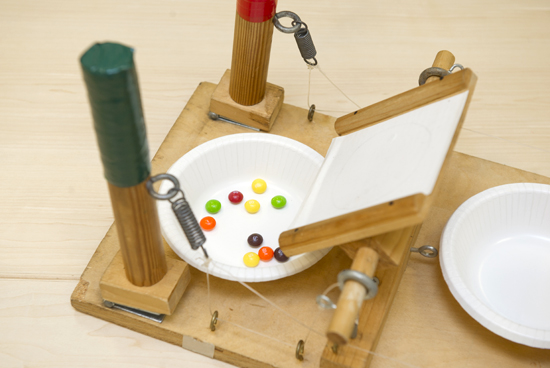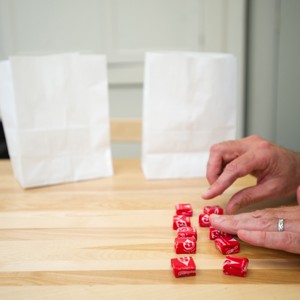Parents know what a potential minefield a playdate can be. Two children could be playing happily together, each with a toy, until they covet the same object. Suddenly, that rocking horse means war.
Most parents stress the importance of sharing early on, whether at home with siblings or at the park with strangers. But that doesn’t mean their preschoolers are early adopters.
“The good news,” says Peter Blake, a College of Arts & Sciences assistant professor of psychology and director of the Social Development & Learning Lab, “is that kids do understand these norms of fairness, even from a young age, even if they don’t follow them.”
Blake should know. He’s a hands-on uncle and the coauthor of a recent paper in PLOS ONE called “I Should but I Won’t: Why Young Children Endorse Norms of Fair Sharing but Do Not Follow Them.”
Blake and his colleagues recruited dozens of three- to eight-year-olds visiting the Living Laboratory at the Museum of Science in Boston to play the Dictator Game, which is commonly used in economic studies and has participants divvy up resources between themselves and another person they’ll never meet. In this case, the currency was four scratch-and-sniff smiley face stickers in the child’s favorite color. That’s gold to a five-year-old.
The researchers knew there would be a judgment-behavior gap for the set of younger children—meaning that the children knew they should share equally, but would still favor themselves. The researchers wanted to better understand why that gap exists. They hypothesized that it could be for one of three reasons: children think the norm applies to others, but not to themselves; they think it applies to everyone, but that no one really follows it; they are unable to control their desires, despite knowing what’s expected of them.
It turns out that Blake and his colleagues were off the mark. All of the children said they and others should share equally, and they predicted that others would behave the same way. But when it came to their individual actions, age made a difference. The three- to six-year-olds predicted they would favor themselves, while the seven- and eight-year-olds practiced what they preached.
“Kids were surprisingly honest in saying, ‘Well, actually, I think I’d keep them all for myself,’” Blake says with a laugh. “In the situation we had them in, their parents are right there, so it’s not like they were concerned about what their parents thought of them.”

The Inequity Game measures kids’ reactions to equal and unequal distribution of candy.
When he asked them to explain their actions, younger children pointed to personal desire, while older children talked about what was expected of them.
Blake’s earlier research, published in Cognition in 2011, examined the idea of fairness through a mobile experiment researchers called the Inequity Game. The setup was Erector Set meets Candy Land. Two children sit at a plywood platform; one is the player, the other the receiver. The player is placed in front of two levers—one green, one red—that control two scales balanced in the middle of the board above three bowls. Pull on the green lever, and candy placed atop the scales dumps into each of the kids’ bowls. Pull on the red lever, and the candy drops into a central bowl that no one could get.
Blake and his colleagues took the game to several Boston parks and recruited more than 200 four- to eight-year-olds to play. The children were paired roughly by age, didn’t know each other, and were taken through two sets of six trials. In one set, each child would receive one piece of Skittles candy, and in the second set, each would receive an unequal number at a four-to-one ratio. The players had to decide to accept the deal (green handle) or reject it (red handle), and researchers recorded their actions and reaction times.
“We expected them to accept all of the equal ones,” Blake says, “but the real test case is the unequal ones.”
Almost all the children immediately accepted an equal split of Skittles, although Blake says some rejected it because they didn’t like that color. The four- to seven-year-old players would reject an unequal split when it wasn’t in their favor (one to four), but happily accepted it when it was (four to one). And the eight-year-olds rejected offers that were inequitable for either themselves or others.
“They showed a strong sense that inequity is wrong, or at least that they were willing to make a sacrifice to prevent it, even when they’re getting more,” Blake says. He also notes that “kids started taking longer when they were faced with the large reward at eight, but not younger.”
Blake thought he’d identified a real biological shift—that by age eight, humans came to understand that equitable sharing is good for everyone. But as he and his colleagues refined the experiment, their results varied. They had players sit at the receiving side before the game began and saw that kids as young as six suddenly rejected advantageous offers.
“Perspective-taking is one thing that can help kids understand what it looks like from the other side,” he says. “If it really were biological, it should be consistent no matter what we do to push on it. We also shouldn’t see a change when we go across cultures.”
But they did. Collaborators in India, Peru, Uganda, and Senegal have had children play the Inequity Game, and consistently the kids reacted at an older age than those tested in the United States. Blake says this may indicate cultural differences in how people address situations involving competition and generosity.
“When I have one and you have four, it costs me to reject that,” Blake says, “but I’m basically saying, ‘I don’t want you to get more than me.’ That’s a competitive move. In the United States, kids may be more attuned to that.” But that doesn’t explain why kids reject an advantageous offer, something he hopes to study further.
Blake found it interesting that there was no difference in children’s sharing habits when factoring in their gender or birth order, debunking common assumptions that girls are more altruistic than boys or that kids with siblings are better sharers.
Taking all this into account, the results of the two games indicate that children’s “self-interested bias diminishes over time,” he says, and may have something to do with “becoming a responsible individual in the culture,” at least in the United States.
So what can parents learn from Blake’s research? “Stay tuned as we try to figure out what people can do to make kids more generous,” he says.
Meanwhile, be patient with those playdates. Or start them once kids turn eight.
Parents who are interested in participating in, or learning more about, child development studies at BU can call 617-358-0561 or visit www.bu.edu/cdl/join-us.

















































Interesting article.
If you are open to spiritual ideas on the subject, The URANTIA BOOK, a channelled work, describes something called a “Thought Adjuster,” which joins the human soul/spirit shortly before the 6th birthday. It is supposed to assist with spiritual and moral development. Google it.
[*I make no claims to the validity of The Urantia Book. I just thought it was an interesting connection.]